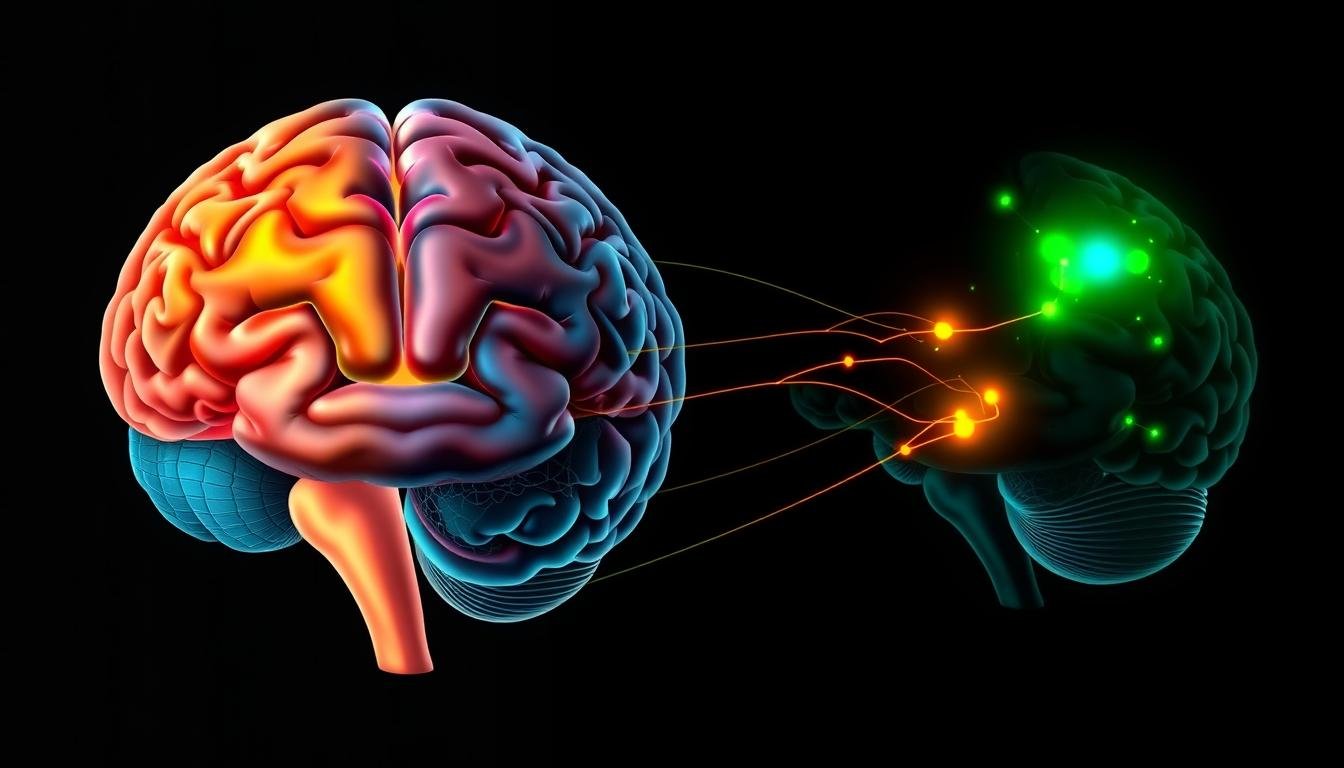Korsakoff Syndrome: Causes, Effects, and Care

Korsakoff syndrome is a serious memory problem often caused by too much alcohol. It’s part of Wernicke-Korsakoff syndrome, a brain disorder from not enough thiamine (vitamin B1). This condition affects people everywhere, but some groups are at higher risk1.
Men between 30 and 70 years old are more likely to get Wernicke-Korsakoff syndrome. Most cases linked to alcohol happen in those over 402. The number of people with this syndrome varies, from 0.4% in France to about 3% in Australia3.
Drinking too much alcohol is the main reason for Korsakoff syndrome. It messes with how the body absorbs and stores thiamine, which is key for brain health. About 80% of people with alcohol addiction don’t get enough thiamine2. This lack affects how brain cells work, especially in areas like the thalamus and corpus callosum1.
It’s important to know about Korsakoff syndrome to catch it early and treat it. Some patients can fully recover with the right care. But, many face ongoing problems. About 25% of those with Wernicke-Korsakoff syndrome need to live in care facilities for a long time3. This shows how serious this condition is and why we need to prevent it and act quickly.
What is Korsakoff Syndrome?
Korsakoff syndrome is a long-term memory problem caused by a lack of thiamine. It often comes after Wernicke encephalopathy, making it part of the Wernicke-Korsakoff syndrome. It mainly affects men aged 30 to 70 who drink heavily, impacting about 12.5% of them45.
Detailed Explanation
Korsakoff syndrome damages brain areas like the thalamus and hippocampus. It leads to severe memory loss and making up false memories. Studies show brain damage in these areas5.
Classification
Korsakoff syndrome is a brain disorder linked to alcoholism and poor nutrition. It affects 1-2% of Americans, more in the homeless and elderly4. Without treatment, it can be deadly, causing coma and death in 10-20% of cases4.
Causes
Korsakoff syndrome is caused by a mix of factors, with thiamine deficiency being key. Knowing what causes Korsakoff syndrome is vital for stopping it and treating it.
Thiamine Deficiency
The main reason for Korsakoff syndrome is not having enough thiamine, or vitamin B1. This can happen for many reasons, but drinking too much alcohol is the biggest one. When the brain doesn’t get enough thiamine, it can lead to serious brain problems6.
Alcohol and Korsakoff Syndrome
Drinking a lot of alcohol over time is closely tied to Korsakoff syndrome. Alcohol makes it hard for the body to use thiamine. Men between 45 and 65 who drink a lot are more likely to get this condition7. Drinking a lot not only lowers thiamine but also harms brain cells, making the syndrome worse.
Other Potential Causes
While alcohol is the main cause, other things can also lead to Korsakoff syndrome. These include being very underweight, having eating disorders, throwing up a lot, and some medical treatments like chemotherapy. People with serious mental health issues or who are homeless are also at higher risk7. Sometimes, problems like HIV/AIDS, kidney failure, and certain stomach issues can also cause thiamine deficiency and Korsakoff syndrome.
Symptoms and Clinical Presentation
Korsakoff syndrome symptoms often show as severe memory loss. People find it hard to make new memories or remember past events. This can deeply affect their daily lives and relationships8.
Memory Impairment
The main sign of Korsakoff syndrome is the inability to make new memories. Patients might forget what was said just minutes ago. Memories from before the syndrome started might stay, but new ones are lost8.
Confabulation
Confabulation is a key feature of Korsakoff syndrome. Patients make up false memories to fill in gaps. These stories seem real to them but are clearly false to others8.
Other Cognitive and Neurological Symptoms
Wernicke-Korsakoff syndrome has more than just memory problems. Patients might feel confused, have trouble with coordination, and see vision issues. They also struggle with making decisions and can seem emotionally flat89.
In severe cases, Korsakoff syndrome can cause hallucinations and even coma if not treated. It often starts after Wernicke encephalopathy symptoms lessen, showing the disease’s progression8.
Diagnosis

Diagnosing Korsakoff syndrome needs a detailed approach. Doctors use different methods to spot this condition. It often comes from long-term alcohol use and bad nutrition.
Clinical Assessment
The first step is a thorough clinical check-up. Doctors look at the patient’s health history, especially alcohol use and diet. They search for signs of memory loss and confusion, which are key signs.
Neurological Examination
Next, a neurological exam is done. Doctors test for balance, coordination, and eye movement issues. These signs can show the need for Wernicke-Korsakoff syndrome treatment10.
Brain Imaging Techniques
Brain scans are key in diagnosing Korsakoff syndrome. MRI scans reveal brain changes, like shrinkage in some areas. These images help doctors confirm the diagnosis and plan treatment4.
Early diagnosis is crucial for effective treatment. With vitamin B1 supplements and avoiding alcohol, recovery can take a year. Starting treatment early improves chances of getting better10.
Treatment and Management
Korsakoff syndrome treatment aims to fix the root causes and manage symptoms. The main goal is to quickly restore thiamine levels and stop brain damage.
Thiamine Supplementation
Thiamine supplements are key in treating Wernicke-Korsakoff syndrome. Doctors first give thiamine through an IV, then oral supplements. This fast action helps stop more brain harm and may help symptoms improve11.
Abstinence from Alcohol
For those with alcohol-related Korsakoff syndrome, staying away from alcohol is crucial. About 12.5% of alcoholics have brain damage. Stopping alcohol is a big part of treatment12.
Supportive Care and Rehabilitation
Supportive care is a big part of Korsakoff syndrome treatment. This includes memory therapy and nutrition support. In serious cases, patients might need to live in a care facility. A study in Glasgow showed 21% of homeless hostel residents had alcohol-related brain damage, showing the need for full care plans12.
Treatment plans usually involve many experts. Good nutrition, staying hydrated, and brain exercises are important. They help manage symptoms and improve life for those with Korsakoff syndrome.
Prognosis

Knowing about Korsakoff syndrome life expectancy is key for patients and their families. The long-term outlook can change a lot, based on many things.
Long-term Outlook
The chance of recovery from Wernicke-Korsakoff syndrome depends on catching it early and treating it fast. If Wernicke encephalopathy is treated quickly, it can stop Korsakoff syndrome from getting worse13. Some symptoms, like muscle problems and vision issues, can get better with vitamin B1 treatment13.
Memory loss, a big part of Korsakoff syndrome, can slowly get better but not fully. This lasting memory problem can really affect someone’s life and daily tasks. How bad the thiamine deficiency is also affects the outcome13.
Factors Affecting Recovery
Many things can change how well someone recovers and their life expectancy with Korsakoff syndrome. How long symptoms last before treatment is very important. Waiting too long can cause lasting brain damage13. Staying away from alcohol is also crucial for getting better and keeping brain function13.
Wernicke-Korsakoff syndrome can happen for reasons other than drinking too much. It can also happen in people with obesity surgery, anorexia, cancer, and even kids getting stem cell transplants14. This shows why it’s so important to spot and treat it early in all kinds of patients.
Prevention
To prevent Korsakoff syndrome, it’s important to live a healthy lifestyle. Eating well and drinking alcohol responsibly are key. These habits help avoid thiamine deficiency.
Healthy Diet and Nutrition
Eating foods rich in vitamin B1 is vital. Include whole grains, lean meats, and legumes in your diet. Regular health checks can spot nutrient gaps early, preventing brain damage15.
Alcohol Moderation
Too much alcohol leads to Wernicke-Korsakoff syndrome. Drinking in moderation or avoiding alcohol is essential. If you struggle with alcohol, getting help is crucial15.
Early Intervention
Spotting thiamine deficiency signs early is critical. Look out for confusion, vision issues, and unsteady walking. Quick action can stop the disease from getting worse and even reverse some brain damage15.
A study showed a patient with severe thiamine deficiency greatly improved with one dose of thiamine. This shows how important early treatment is14.
Impact on Patients and Caregivers
Korsakoff syndrome does more than just cause memory loss. It deeply affects patients’ lives and their relationships. It impacts 1 to 2 percent of the U.S. population, with more men than women being diagnosed16.
Quality of Life Considerations
Living with Korsakoff syndrome is tough. It affects 12.5% of those with alcohol use disorder, leading to severe self-neglect. This also increases the risk of medical problems17.
Many patients think they can do more than they really can. In nursing homes, 70% of them overestimate their abilities18.
Challenges in Daily Living and Relationships
Wernicke-Korsakoff syndrome also strains relationships. Patients may become irritable, agitated, and apathetic. This can make it hard for them to connect with loved ones18.
Caregivers face big challenges too. They deal with emotional and practical issues. Patients may not realize their limitations and can resist help18.
In nursing homes, caregivers work hard to make life better. They stay committed and treat patients with respect. Their goal is to improve the lives of those with Korsakoff syndrome18.
Current Research and Future Directions
Korsakoff syndrome research is growing, helping us understand this complex disorder better. Scientists are looking into new ways to diagnose, treat, and prevent it.
Ongoing Studies
Recent studies on Wernicke-Korsakoff syndrome are diving into thiamine deficiency’s cellular mechanisms. They’re also looking at genetic factors that might make some people more likely to get it. MRI scans are giving us new views into the brain changes seen in Korsakoff syndrome19.
Korsakoff syndrome affects more than just memory. It also impacts executive and emotional functions. ERP studies have found brain response changes in patients, showing early processing problems20.
Potential New Treatments
New ways to help with memory loss are being explored. Scientists are looking into medicines to go along with thiamine. These treatments aim to tackle the wide range of cognitive and emotional issues in Korsakoff syndrome.
Preventing alcohol-related brain damage is another area of focus. Research on alcohol dependence is leading to new ways to lower relapse risk. This could help prevent Korsakoff syndrome from happening in the first place20.
Conclusion
Korsakoff syndrome awareness is key for early detection and prevention. It’s caused mainly by thiamine deficiency, often due to chronic alcohol misuse. This condition can lead to serious memory and behavior problems in about 80% of untreated patients21.
Recap of Key Points
There’s not much research on Korsakoff syndrome, with only 160 papers in recent years21. It affects memory and learning, causing significant cognitive issues21. Brain scans show damage in areas important for memory21.
Importance of Awareness and Early Detection
Detecting Wernicke-Korsakoff syndrome early is crucial. Wernicke’s encephalopathy can be treated, but Korsakoff syndrome often can’t21. Early diagnosis depends on symptoms, lab tests, and imaging. Knowing the risks can help prevent it21.
Understanding Korsakoff syndrome and its causes is important. We can lower its occurrence by acting quickly. Treating thiamine deficiency early can help those at risk22.
Source Links
- https://www.ncbi.nlm.nih.gov/books/NBK539854/ – Korsakoff Syndrome – StatPearls – NCBI Bookshelf
- https://my.clevelandclinic.org/health/diseases/22687-wernicke-korsakoff-syndrome – Wernicke-Korsakoff Syndrome: Causes, Symptoms & Treatment
- https://www.ncbi.nlm.nih.gov/books/NBK430729/ – Wernicke-Korsakoff Syndrome – StatPearls – NCBI Bookshelf
- https://rarediseases.org/rare-diseases/wernicke-korsakoff-syndrome/ – Wernicke-Korsakoff Syndrome | Wernicke’s Encephalopathy
- https://en.wikipedia.org/wiki/Korsakoff_syndrome – Korsakoff syndrome
- https://www.ninds.nih.gov/health-information/disorders/wernicke-korsakoff-syndrome – Wernicke-Korsakoff Syndrome
- https://www.webmd.com/brain/wernicke-korsakoff-syndrome-facts – What Is Wernicke-Korsakoff Syndrome?
- https://medlineplus.gov/ency/article/000771.htm – Wernicke-Korsakoff syndrome: MedlinePlus Medical Encyclopedia
- https://www.niaaa.nih.gov/publications/brochures-and-fact-sheets/wernicke-korsakoff-syndrome – Wernicke-Korsakoff Syndrome | National Institute on Alcohol Abuse and Alcoholism (NIAAA)
- https://alzheimer.ca/en/about-dementia/other-types-dementia/rare-types-dementia/wernicke-korsakoff-syndrome – Wernicke-Korsakoff syndrome
- https://emedicine.medscape.com/article/288379-treatment – Approach Considerations, Diet and Activity, Referral and Follow-Up Care
- https://www.ncbi.nlm.nih.gov/pmc/articles/PMC3545191/ – The Evolution and Treatment of Korsakoff’s Syndrome: Out of Sight, Out of Mind?
- https://www.mountsinai.org/health-library/diseases-conditions/wernicke-korsakoff-syndrome – Wernicke-Korsakoff syndrome
- https://emedicine.medscape.com/article/288379-overview – Wernicke-Korsakoff Syndrome: Practice Essentials, Background, Etiology
- https://www.healthline.com/health/neurological-health/wernicke-korsakoff-syndrome – Wernicke-Korsakoff Syndrome: Risks, Causes, Symptoms, and More
- https://www.caregiver.org/resource/wernicke-korsakoff-syndrome/ – Wernicke-Korsakoff Syndrome – Family Caregiver Alliance
- https://www.ncbi.nlm.nih.gov/pmc/articles/PMC7898846/ – Unraveling Apathy in Korsakoff Syndrome Patients Receiving Long‐Term Care With and Without Cerebrovascular Comorbidity
- https://www.ncbi.nlm.nih.gov/pmc/articles/PMC8151566/ – Caregivers’ perspectives on good care for nursing home residents with Korsakoff syndrome
- https://www.ncbi.nlm.nih.gov/pmc/articles/PMC10532206/ – Neuropsychiatric and Neuropsychological Aspects of Alcohol-Related Cognitive Disorders: An In-Depth Review of Wernicke’s Encephalopathy and Korsakoff’s Syndrome
- https://www.frontiersin.org/journals/psychology/articles/10.3389/fpsyg.2016.00168/full – Frontiers | New Perspectives in the Exploration of Korsakoff’s Syndrome: The Usefulness of Neurophysiological Markers
- https://www.spandidos-publications.com/10.3892/etm.2021.10566 – Korsakoff syndrome: An overlook (Review)
- https://www.ncbi.nlm.nih.gov/pmc/articles/PMC8383329/ – Korsakoff syndrome: An overlook (Review)






